
Leader of Bridgwater Town Council Brian Smedley (Bridgwater Westover) has called for discussion on a position paper for the Unitary Devolution pilot based on his councils’ legacy ambitions for the demise of Sedgemoor and the creation of a vast new Somerset Unitary. He explains “The old Bridgwater Borough Council is well remembered as the most popular, hands on locally representative council we’ve ever had here, with a history stretching way back to its first Mayoralty in 1468. Bridgwater is rightly identified on our signposts as ‘historic’ throughout the centuries, leading on changes that saw Bridgwater as the first town to petition against the slave trade in 1785, the only British town to vote against the Munich agreement in 1938, the site of the country’s first Art Centre in 1946 and the popular developments of the 1950s and 60s including the social house building programme and the increase in leisure facilities. In 1974 this ‘People’s Borough’ was brought to a crashing end with the advent of Sedgemoor District Council who assumed all its powers, gained some new ones and widened its area to a 100,000-range including as far away remote parishes as Cheddar and Burnham. After 1974 Bridgwater had almost no powers apart from being able to choose a ceremonial mayor. That changed for the better in 2004 when the Labour Government responded to the Town’s petitioning to create a Town Council. Since then, until now that 3rd tier authority has existed in Bridgwater, the closest level of local Government to the people, and remains the only Labour run town council between Bristol and Exeter. Now, with the Unitary decision going in favour of Somerset County and the abolition of Sedgemoor District imminent, Bridgwater Town Council’s ambition is to return to a position as close to that pre 1974 level of service delivery as we can. We see the possibility of devolution of powers as a result of unitary as the latest opportunity to achieve this.”
Bridgwater Town Council ‘Position Paper’ By David Mears (Town Clerk)
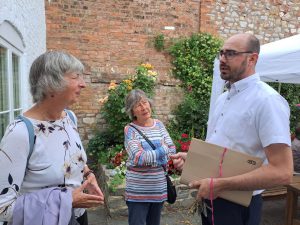
Town Clerk David Mears has been engaged with County and District in scoping out the Unitary options and as a result Bridgwater is seen as a ‘Devolution pilot’.
Bridgwater Town Council is ambitious to take a more hands on approach to service delivery in Bridgwater. Bridgwater Town Council wants to see local ownership and local delivery of services and management of assets, that meet the wider needs of the local community. With devolution, the Council will be able to have a flexible approach to change the delivery model or management to reflect the needs or challenges of the community.
Devolution also brings economies of scale. ‘More likely than not, a more centralised model (of service delivery) would entail higher operating costs than the current devolved structure. Savings only arose if functions were dropped. Birmingham City Council has devolved significant elements of its service delivery and policy making’.
Bridgwater Town Council is of the view that local service delivery and ownership will allow for increased accountability and participatory democracy in these areas, which will strengthen community governance. With the move to a large unitary authority service delivery and decision making will become more centralised. Bridgwater Town Council operates a forum system to allow the public of Bridgwater to help the Council understand local needs, issues and allows the Council to shape decision making and policy development with the participation of the public.
What does Bridgwater Town Council seek from devolution?
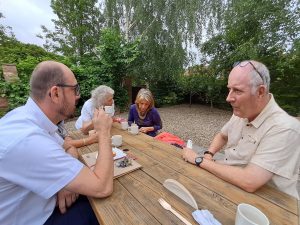
Bridgwater Town Council along with the new Somerset Council (as per the business case) shares the following views
- Sustainable delivery of outstanding public services to improve the quality of life for residents and businesses.
- Empower communities and embed delivery at local level to increase community resilience and the ability to respond to local challenges.
- Working with key partners to better influence local service delivery
Bridgwater Town Council aims to make further improvements to the appearance of public space and buildings in accordance with Bridgwater Town Council’s Climate Emergency Strategy.
What does Bridgwater want devolved?

Bridgwater Town Council seeks the transfer of the following:
- ALL Parks and Open Spaces
Other assets / services
- Random pockets of land from SCC / footpath maintenance.
- Bridgwater Docks (SCC).
- Market Charter and on-street concessions.
- Street Cleaning, litter and dog bins; if not a review on the current delivery and financing from BTC (in excess of £40k per annum).
- Sydenham Community Centre (if the tenant does not want to take ownership).
- Library (SCC).
- Rollercoaster Building and grounds.
- Re-Creation Youth & Community Centre, Hamp
- Colley Lane Depot (or other land that could be used as depot).
- Selection of Car Parks (to balance the cost-of-service delivery).
- Cornhill Retail Complex (to balance the cost-of-service delivery).
The outcomes of transferring parks open spaces and buildings:
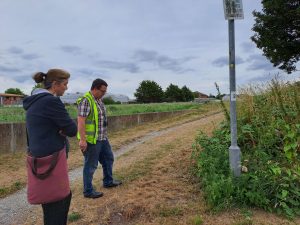
Green Agenda:
- to create wildlife corridors.
- increase tree planting.
- changing the impact on the environment by using greener equipment, like electric vans,
- mowers and strimmer’s.
- Increase the use of renewable energy across all buildings and park and open spaces
- lighting (currently underway across BTC properties).
Outcomes in Key areas identified:
- The Meads: enhance the work that is currently underway; push ahead with Wetland Meadows, better access (bridges, boardwalk etc), interpretation boards, willow sculptures.
- Blake Gardens: redesign of the flowerbeds to reduce wastage, increase biodiversity and year-round colour and increasing events, community picnics, including the use of the bandstand.
- St Matthews Field: making more use of the space; increasing events throughout the year. Small public scale questionnaire and general feedback received, the public would welcome more events on St Matthews Field.
- Rollercoaster Building: to refurbish the building, which will enhance and expand the delivery of youth provision within the building.
-
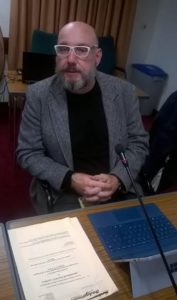
Cllr Leigh Redman has been campaigning for facilities on the Hamp estate for years. Hamp Recreation Building: refurbish and restore youth and Community provision to the estate.
- The Docks: to renovate the docks and operate with a new business model, bringing a neglected community asset back to life, which will enhance the local economy and provide a safer and more pleasant area for local residents.
- Partnership working with the new Somerset Council: Bridgwater Library, BTC could provide targeted attention and support and safeguarding for the future.
- Parcels of land and footpaths: WHY? BTC would view them differently. We need a simpler process across Somerset to tidy/maintain and increase pollination and tree cover on these random pockets of land; and
- Devolution of service delivery and asset ownership will protect and enhance the level of service delivery. Protect in the sense of having dedicated staff, that will not have demands in other areas of the county and will not be used to backfill staff shortages elsewhere.
There can be no genuine Devolution / Decentralisation / Localism unless actual decision making/control and funding is transferred.
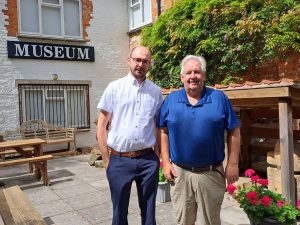
Town Clerk David Mears with Blake Museum’s Stewart Richards. Big plans for the Museum with the Town Deal fund. Heritage should be in the hands of the council closest to the people. Some form of funding needs to be transferred to ensure Devolution / Decentralisation / Localism is broadly cost neutral.
There must be financial autonomy. This will provide Somerset Council with confidence with agreements/budget setting. It will also allow Town and Parish Councils to operate the service delivery/assets in a flexible way without restrictions. Town and Parish Councils operate with lower overheads and can reinvest savings in undertaking improvements that will benefit the local community.
All parties must be clear – cost neutral at the point of transfer. Future rising costs or even savings must not revert back to Somerset Council.
Any assets transferred must be in a decent state of repair / good condition. Somerset Council must either make good or provide sufficient funding for the Town/Parish Council to undertake this work.
